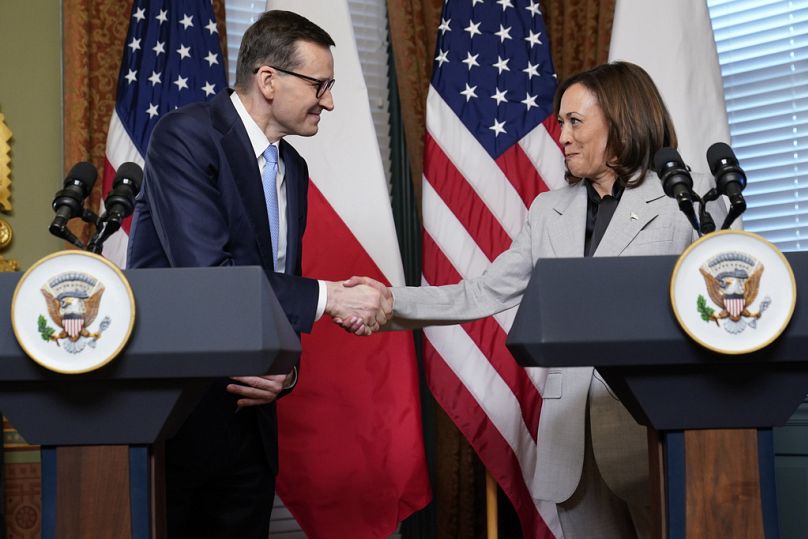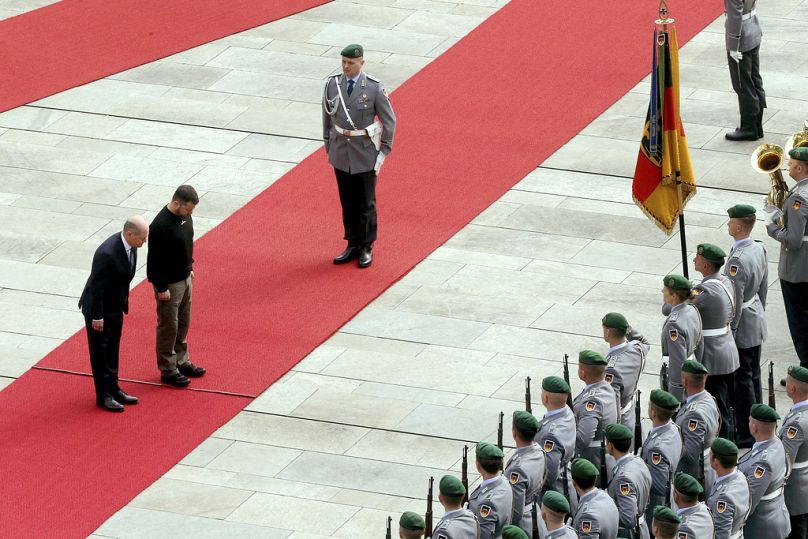If the heads of the bloc's member states are to build and maintain a united foreign policy, they will need to capitalise on areas that create consensus, Dr Jana Puglierin writes.
From escalating tensions in Taiwan to mutual accusations of spying, the relationship between China and the United States has reached its lowest point in years and is showing no signs of improvement.
As Europe contends with prospects of a military confrontation between the two nations, Russia’s ongoing war against Ukraine, and continued disruption of global supply chains post-COVID, leaders in Brussels and the wider EU27 are under growing pressure to redefine the bloc’s foreign policy.
A major new opinion poll by the European Council on Foreign Relations (ECFR), conducted across 11 EU member states, has confirmed the deep impact of the war in Ukraine on citizen perceptions of the global order and what lies ahead.
It shows that EU leaders will face a key challenge as they attempt to shape a united foreign policy: following public opinion at a time when trust in government and institutions is low while making unpopular but necessary decisions.
To do so, they must understand what motivates the public and communicate clearly about the future.
The survey illustrates that Europe’s relationship with Russia has undergone a real turning point, both for European leaders and for public opinion.
The share of respondents who see Russia as Europe’s “rival” or “adversary” has increased from around one-third to almost two-thirds in the space of two years – a sign that EU leaders and their voters are in sync.
European leaders have a clear mandate for a policy that seeks to establish European security not with Russia but against it.
Uncertainties and differences over Russia prevail
But the survey also reveals that differences surrounding the EU’s future relationship with Russia run deep.
While German Chancellor Olaf Scholz has indicated that he would be open to resuming economic relations with Russia if the country puts an end to its aggression, Polish Prime Minister Mateusz Morawiecki has expressed an unwillingness to normalise relations with a criminal regime.
And these competing positions are reflected in voters’ opinions, with ECFR’s dataset showing that 39% of Polish respondents want to end all relations with Russia after the war, while a quarter of Germans (26%) are willing to resume full economic cooperation.
This presents a potential problem for EU leaders in the mid-to-long term and suggests that if they are to build and maintain a united foreign policy, they will need to capitalise on areas that create consensus.
Cultivating close relations with the US while taking measures to increase European self-sufficiency is likely to receive support, given that three-quarters of European citizens now believe Europe needs its own defence capabilities.
Although they broadly support the transatlantic relationship, with around 30% of Europeans seeing the US as an “ally” and 40% seeing it as a “necessary partner”, they don’t view the Biden administration’s strong engagement in Ukraine as an indication that the US will always protect Europe.
Most Europeans believe the EU should sit out a US-China conflict
European citizens want a foreign policy that is less dependent on other actors and their decisions.
This is also reflected in the fact that the perceived closeness of Europe to the US does not translate into a willingness to support the US against China in a hypothetical conflict over Taiwan.
In the event of military hostilities between these two superpowers, ECFR found that just a quarter of the Europeans it surveyed would favour taking America’s side, while between 49% (Sweden) and 80% (Austria) think that the EU should avoid any direct role and strike a position of “neutrality”.
The prevailing view in almost every country surveyed is that China is a "necessary partner". Emmanuel Macron’s claim that Europe should not get caught up in crises “that are not ours” after his recent visit to Beijing has caused a backlash among European allies, but it accurately reflects European public sentiment.
At the same time, Europeans have expressed their appetite for reducing China’s economic influence on the continent.
About 65% of all respondents said they were against Chinese ownership of key infrastructure in Europe, such as bridges and ports.
Optimism still prevails
Managing public expectations, and enlisting support for the difficult strategic decisions ahead, is unlikely to be easy for European leaders – even on policies that are rooted in relative consensus.
A concerning insight from the poll is that 60% of European voters do not feel heard by their leaders in relation to foreign policy.
Restoring trust with the electorate and putting in place consultations to include the public in decision-making is necessary to prevent further disillusionment with institutions and political parties.
In doing so, EU leaders should be aware that Europeans’ opinions about future foreign policy appear to be based on highly optimistic scenarios.
Asked about the prospect of Trump’s re-election, over 60% of respondents across the 11 countries considered it an unlikely or highly unlikely scenario.
Some 53% of respondents think the same about a military confrontation between the U.S. and China.
A conversation is much needed
Considering how often political events with destructive consequences that were thought to be highly unlikely have recently occurred, European leaders should enter an active conversation with their public to prepare them for various geopolitical scenarios and difficult decisions and communicate the dangers of inaction to them.
By understanding where and how voters can be convinced, they can forge a path ahead.
Dr Jana Puglierin is a Senior Policy Fellow at the European Council on Foreign Relations and has been the Head of its Berlin office since January 2020. She directs ECFR’s Re:shape Global Europe project, which seeks to develop new strategies for Europeans to understand and engage with the changing international order.
At Euronews, we believe all views matter. Contact us at view@euronews.com to send pitches or submissions and be part of the conversation.














